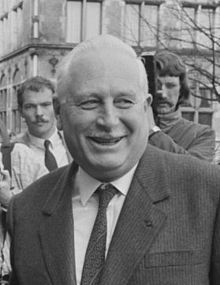André Giraud
André Giraud (born April 3, 1925 in Bordeaux , † July 27, 1997 in Levallois-Perret , Département Hauts-de-Seine ) was a French politician and a high functionary, administrative officer and manager. He was a member of the Parti républicain and the UDF .
Life
André Giraud graduated from the École polytechnique (1944–1948 or 1949) and after completing his studies was accepted into the Corps des mines (title: Ingénieur du corps des mines ), a kind of inter-ministerial technical working group.
Careers in the energy industry
Until 1978 he went through a career in high ministry offices and in state companies, especially in the oil industry and in the nuclear industry, which emerged in France in the 1970s from the military complex that had carried out the nuclear armament of France ( Force de frappe ). He contributed significantly to the fact that the French nuclear industry was very close to the state and is still today.
Giraud became
- 1958–1964 Directeur général adjoint de l'Institut français du pétrole (this has been called IFP Énergies nouvelles since 2010 ),
- 1964–1969 Directeur des carburants in the French Ministry of Industry,
- 1965–1971 Vice President of Renault ,
- 1970–1978 Administrateur général délégué du gouvernement auprès du Commissariat à l'énergie atomique (CEA), Administrateur de l ' Électricité de France (EDF) and
The massive expansion of new nuclear power plants in France was not (as is often assumed) a reaction to the 1973/74 oil crisis . After de Gaulle's resignation (1969), the French Atomic Energy Commissioner (CEA) had around 3,000 employees. These were underemployed after the Force de frappe was armed. De Gaulle and many other French politicians sought to be as independent and self-sufficient as possible from the United States . Therefore one wanted to minimize the dependence on oil. Since the Suez Crisis (1956), the closure of the Suez Canal after the Six Day War (1967–1975) and the decolonization of Africa (from 1961), this dependency had moved into general awareness.
In 1971 André Giraud became head of the Atomic Commissioner. In this capacity he published the following resolute plan in March 1971:
- In the years from 1971 to 1975 four or five (instead of only two) new nuclear power plants (each with several nuclear reactors ) with a total output of 8,000 megawatts were to be built;
- Fessenheim I in Alsace and Bugey II near Lyon were planned as the first new buildings .
The following dates the start of construction to show the speed of the expansion of the French nuclear energy: Bugey II on November 1, 1972 Bugey III on September 1, 1973 Bugey IV on June 1, 1974 Bugey V These four on 1 July 1974. pressurized water reactors had a net output of 3580 MW (910 + 910 + 880 + 880 MW). However, the construction times were significantly longer than expected (completion between May 1978 and July 1979). Seven French nuclear power plants went into operation in 1980, eight in 1981, two in 1982, four in 1983, six in 1984, four in 1985 and six in 1986.
From 1976 to 1978 Giraud was President of Cogema ( Compagnie générale des matières nucléaires , today Areva or Areva NP ).
Political career
Giraud was Industry Minister in the 3rd Cabinet of Prime Minister Raymond Barre from April 3, 1978 to May 13, 1981 .
In May 1981 a socialist - François Mitterrand - became French President for the first time (he won against the incumbent Valéry Giscard d'Estaing and remained in office until 1995). Giraud lost his ministerial post as a result; In 1981 he took over a professorship at the Université Paris-Dauphine and in 1982 founded the CGEMP ( Center de géopolitique de l'énergie et des matières premières , roughly 'Geopolitical Center for Energy and Raw Materials').
March 20, 1986 to May 10, 1988 he was defense minister in the second cabinet of Jacques Chirac (then there was a cohabitation ).
In 1988 Giraud withdrew from politics; He remained a sought-after expert and founded the consulting company Compagnie générale d'innovation et de développement (Cogidev) in 1991 .
Giraud died of cancer on July 27th in Levallois-Perret near Paris.
Web links
- Biography of André Giraud on annales.org
Individual evidence
- ↑ a b zeit.de of April 23, 1971: De Gaulle's legacy is liquidated
- ↑ spiegel.de 1997: Obituary
| personal data | |
|---|---|
| SURNAME | Giraud, André |
| BRIEF DESCRIPTION | French politician and functionary |
| DATE OF BIRTH | April 3, 1925 |
| PLACE OF BIRTH | Bordeaux , Gironde department , France |
| DATE OF DEATH | July 27, 1997 |
| Place of death | Levallois-Perret , Hauts-de-Seine department , France |

